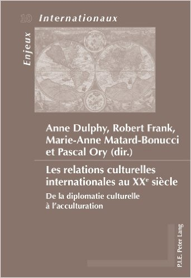In this fifth post in a series of reflections on the New Directions in French History Conference in London in September, Charlotte Faucher (doctoral candidate, Queen Mary) explores ideas about ‘flows’ between countries in Europe, raising issues around ‘transnational’ and ‘comparative’ history writing.
My work relies on theories of transnationalism, cultural transfers and, to a lesser extent, comparative history. More specifically, I look at relations between countries (especially France, Britain, Germany and Belgium), individuals (state and non-state actors), ideas and seek to identify dialogues as well as conflicts between these. I also seek to consider the impact these aforementioned relations and ideas have on people and on the societies, and communities in which they live(d). This perspective is often absent from studies on international relations (which largely focus on institutional politics) and invites historians to consider the national and local within a transnational approach. For example, we might consider how relations built at a local level benefit from and rely on transnational networks.
What is also of interest, and which perhaps tends to be overlooked in much historical research, is to consider the disruption of traditional links and flows, such as happened during the two world wars, when, for example, communication links between Britain and mainland Europe were difficult. Historians thus need to investigate whether individuals, communities and states developed substitution strategies to cope with the suspension of these links. For example French and British academics and intellectuals struggled to sustain dialogues with their colleagues living on the other side of the Channel but refugee and exiled communities which developed in Britain partly provided a space to cope with the intellectual reshuffling the war(s) had caused. As Chris Bayly suggested in a 2006 conversation on transnational history, studies of diasporas (which would include movements of laborers, soldiers, intellectuals, technicians, etc.) are still a very worthwhile way of approaching transnational history, provided these studies grapple closely with the reception and domestication of such people and modes of life in the “host” society.[1]
Although the field of diaspora study has grown since this conversation was published, there are still issues to be considered, notably those that relate to the second point that Bayly makes – that of reception and domestication. Amongst other concepts, I have found that of acculturation especially helpful.[2] Olivier Francfort has defined this process as ‘the long-lasting adoption of behaviour and ideas from other societies, a phenomenon which becomes invisible over time.’[3] To go slightly further, one may wonder what historians make of transnationalism when the networks and connections they have identified have been integrated and incorporated within a society or community?
Overall, I think historians will need to reflect more on the political, most importantly the social and cultural impact of the “flows” that they study through the transnational approach. This is a conspicuous challenge in the sub-field of cultural diplomacy as historians, myself included, have primarily focused on policies, institutions and agents but have yet to explore the impact (successes and failure alike) of a country’s (or a community’s) external cultural policies. Similarly, it seems to me that we have not paid enough attention to class structures (at least in the sub field of cultural diplomacy). To that end, it is perhaps worth going back to Pierre Bourdieu’s 2002 article on the social conditions of the circulation of international ideas in which he emphasised the social processes at work in the procedures of the book trade. Notably, the selections of authors and works, together with translations, marketing, editing and publishing are choices which reveal many of the specific ambitions of editors regarding the international target audience and its sociology.[4] Much of the research on cultural diplomacy remains closely linked to institutional history and does not go beyond diplomatic circles or groups formally or informally in charge of carrying cultural activities. Although writing the history of institutions and individuals whose activities have shaped and promoted transnational networks is a necessary step towards a better understanding of the history of cultural diplomacy, historians needs to look at the receiving ends of the policies they investigate.
Within the field of international relations transnational approaches are valuable as they allow historians to go beyond bilateral relations (a line of study which is especially prominent in the field of cultural diplomacy). Transnationalism is indispensable to historians if they are determined to understand the underlying causes of the external cultural policies of a country (or a community). For example, the Popular Front’s cultural policies in Britain cannot be understood without acknowledging the development of competing policies in Germany, Spain and Russia. To that end, comparative history is also useful, all the more so as state and non-state actors were themselves motivated by and compared their strategies with other countries’ policies.
[1] ‘Conversation: On Transnational History’, featuring C. A. Bayly, Sven Beckert, Matthew Connelly, Isabel Hofmeyr, Wendy Kozol and Patricia Seed The American Historical Review (2006) 111 (5), 1441-1464.
[2] The acculturation process, through cultural transfers and appropriation is described in detail by Sophie Jacotot in Anne Dulphy et al., eds., Les Relations Culturelles Internationales Au XXe Siècle: De La Diplomatie Culturelle À L’acculturation (Bruxelles: P.I.E.-Peter Lang, 2010). Her chapter looks at American dances in Paris during the interwar period. In her chapter, she argues that amateur dance groups as well as specialised journals and the rise of mass media offered a favourable ground for the appropriation of new embodied dance techniques that everyone could potentially adopt.
[3] Olivier Francfort, Introduction to ‘Transferts et acculturation’ in Anne Dulphy et al., eds., Les Relations Culturelles Internationales Au XXe Siècle. Original version : ‘…l’adoption durable de comportements, d’idées issus d’autres sociétés.’ p. 203.
[4] Pierre Bourdieu, ‘Les Conditions sociales de la circulation internationales des idées’, Actes de la recherche en science sociale, Vol. 145, (2002), 3-8.



